- Home
- Tony Roberts
Casca 43: Scourge of Asia Page 6
Casca 43: Scourge of Asia Read online
Page 6
Casca grinned. “Of course, this information requires a service on my part.” The mercenary indicated the hilt of his sword. “In the meantime, I offer my services as a warrior to you.”
Yayik looked dubiously at the scruffy individual. “To accept goods without knowing their quality first is foolish.”
“Then you may inspect the quality as you seem fit.”
Yayik put a hand to his chin. This stranger was a very interesting individual. He waved a finger at one of his two body guards. “Khuttan, show this fellow how a Khwarazami wields his sword.”
Khuttan smiled wolfishly and drew out his curved sword. Casca got to his feet and stepped into the street, his sword in hand. Adil remained seated, eyes wide. Yayik leaned over to her. “Do not worry, pretty one. Once my man slices your master in two you shall be mine.”
Adil flushed. “Then I pray to Allah that it is your man who finds himself duplicated.”
Yayik grunted in amusement. Khuttan was very strong and skilled with the sword, and the merchant himself had witnessed at least a dozen men falling to the guard.
Casca faced the giant and watched his stance. Balance played as much part in combat as skill with the sword. One can use balance to create advantages against a better sword. The Asian seemed sure footed and went straight to the attack, using his strength to try to batter away Casca’s defense. However the mercenary blocked the attack and feinted forward, watching how Khuttan reacted. As expected, he moved to parry without retreating too far. Ah, a confidant man not used to giving ground. Good, over confidence and pride.
What Khuttan could not possibly know was that Casca had been a gladiator in the Roman arena and had learned his skills there. A gladiator who survived became adept in the use of the blade. Casca now stepped back and looked thoughtful, intending Khuttan to see the worry.
The guard saw the expression and smiled again, advancing with blade rising and falling. Twice the blows were blocked, Casca giving ground, but the third time he suddenly stepped aside, took a large step forward and slapped Khuttan on the ribs with the flat of his blade. The guard, caught off-balance, had stumbled past and found to his chagrin he’d been bettered.
Yayik clapped his hands together in delight. He’d seen quality and had not lost his precious body guard into the bargain. “By the prophet! That’s the first time I’ve seen Khuttan bested!” He waved to Casca to return to his seat next to Adil who was smiling in relief. “What is your name, stranger?”
Casca told him.
“Greek?”
“I began my journey in Constantinople” he said truthfully.
Yayik nodded in satisfaction. He was pleased in getting his nationality correct. “It is good. Therefore you will accompany me on my next journey to Khiva, which is just down the Oxus River. We might discover more about this Timur while we are there.”
CHAPTER NINE
Khiva was a smaller version of Urgenj, sited on a small rise above the Oxus, a collection of flat-topped sunbaked mud brick buildings with an occasional stone construction set amongst them. These were the more important municipal buildings and the inevitable mosque, as well as the citadel. A thin watercourse meandered lazily through the settlement before exiting and vanishing in the hazy distance, its banks infrequently dotted with scrub or trees. In the distance herds of horses grazed and small numbers of herdsmen kept the animals moving on for fear of being spotted by thieves or bandits. Here was the borderland between the loose confederation of tribes that inhabited Transoxiana, and the more united people of Khwarazm.
Refugees from the excesses of the Moghuls had fled to this part of the world and their camps were seen dotted about, small collection of yurts surrounded by goats or horses. Yayik indicated that Timur would recruit men for the Sistan campaign from these. Casca knew what he meant. Men without land or jobs needed something to give them purpose, and a warlord from their own land promising booty and war would be hard to resist.
Khiva was swarming with people. In these hard times it was better to live in the relative security of the walled cities of the regions. The recent ravages of the Plague had depopulated large sections of the cities so places were easy to find. Yayik however had a place here, ready for him each time he visited. It was a large, well-furnished house of two floors which in times past had belonged to minor officials of the Chaghadai Khanate. Now that Khwarazm had become independent under the Sufi Dynasty, these minor officials had either fled or had been put to death.
Casca found himself in comfortable quarters with Adil next door. Arabesque partitions stood all around and much of the decor was of silk. Yayik summoned him to his side shortly after they arrived. “I have made enquiries and learned that Timur had indeed been here but now he has departed for the south together with Amir Hussain and a sizeable force with which to fight in Sistan.”
Casca felt a stab of disappointment. Yet again he had been too late.
“Do not worry,” Yayik rested a hand on his arm, “for he shall return in the spring of next year.”
“How do you know this?”
Yayik smiled enigmatically. “It is not for me to tell you, but for Timur himself. Sufficient to say I would be happier if the Moghuls left Transoxiana so that trade would return to normal.” He frowned, then handed Casca a small lacquered box. “Take care of this, my Greek friend. If the Moghuls found this upon your person your head would be separated from your shoulders.”
“What?” Casca was stunned. He had no wish to find himself headless, one particular fate he wished to avoid at all costs. For someone who could not die he had no compulsion to find out what would happen in that instance. “Why do you give this to me, and what is in this box?”
“Ah, that is not for you to know. All you are is a humble messenger, a carrier if you like. As to why I give it to you, well shall we say I have enemies who would sooner betray me to the Moghuls than see me prosper, and it is this item I have given you that should not fall into their hands.”
“But why me? You have known me just a few days. For all you know I could be a Moghul spy.”
Yayik smiled again. “If you were you would have killed Adil. No, you are a man who can be trusted. I have spoken to the woman at length and she has told me much about you. Now you must go and leave me. To be seen here with me for any length of time is dangerous. You will find enough items in your room for you to go on to Bukhara safely.” Casca, puzzled by the sudden dismissal, stood up. As he turned to leave, Yayik gave him one last piece of advice. “My friend, when you meet Timur, give Adil to him freely. Do that and you will be his friend. Do not, then he will be your enemy.”
With that Casca was dismissed. He wandered slowly into his room and placed the box on a small table and sat regarding it for a while. He had a feeling of déjà vu, and his mind drifted back a century to when he had been riding with Subedei and his Horde across Russia. He had then been given a stone to guard, a khanate stone, a symbol of rule over the Mongol tribes. He’d been selected to carry it because of his neutral stance, and had found both sides who wished to take over the khanate desired it so that they would gain legitimacy when they made their move.
Casca had finally passed it on when he was leaving Hungary and had guessed the stone had found its way to Mongke, the candidate he had finally backed. It hadn’t stopped a civil war though, from what he had later learned, but Mongke had triumphed. When Mongke died in 1259 it had triggered off another civil war, so Casca guessed either the stone had been lost or that it had become seen as merely a pretty bauble with no significance. Had Kubilai, the winner of the civil war, taken the stone? Casca thought back to his time at Kubilai’s court. No, he had not seen it during his time in China.
It must, therefore, either have been lost or taken by one of Mongke’s descendants as a family heirloom. It would be a fantastic co-incidence if this was indeed the stone, but the box size was perhaps a little too small for it. He had a gut feeling it wasn’t that.
He put the box away hidden in a pile of clothes. Time to practic
e his martial abilities – no good sitting around on his ass thinking; that had gotten him into too much trouble in the past. Best to do something constructive, like practice cutting idiots’ heads off.
He changed into a pair of light boots, thin trousers and a light shirt. He took his sword and wandered out into the courtyard. He’d seen a post in the center of the yard with the tell-tale gouges in it. He squinted up at the sun, then slipped off his shirt.
His muscles moved like things alive under his skin as he went about his routine, feinting, changing stance, even hands, then chopped or slashed at the post. His torso drew the attention of all who stopped to stare, the scars were enough to make anyone do that. Adil came to the doorway and looked out, once again staring at his physique. She’d never seen anything like it before. Something in her memory stirred, something she’d heard years ago. She would have to try to remember what it was and where it was she had heard it. Thoughtful, she returned to her room.
Casca enjoyed the process of hacking at the post. It brought back many memories when he did this and he liked the feeling of nostalgia. At times like this he didn’t have to worry about being distracted so he could relive those times free of interruption. It was a familiar feeling too, the feel of a hilt in his hand, the extension of his arm in the form of a blade.
Soldier, you are content with what you are….. the words drifted into his brain, caressing his thoughts. Yes, Jew, he said back to the long gone crucified one, I am content with being a soldier. It’s what I am, it’s what I do best. He smote the post again. Rome. The pain in his chest swelled. Rome. Oh, how he longed to go back there again, to those times. Forget all the bullshit from priests, kings, emperors, warlords. How he wished he could live the simple life of a normal soldier again.
Rome had been his mother and father after his folks had succumbed to the plague. Sometimes he had fallen out with his surrogate parent, but always he came back. Now – it was a feeble outpost on the edge of the Greek speaking part of Europe. He was doing all this for Rome, or to be precise, what Rome had become.
He would somehow find a way to bring an army to fight the Ottomans. Somehow.
CHAPTER TEN
Adil was very quiet upon the resumption of their journey, and ventured nothing unless spoken to. Casca rode deep in thought. Yayik’s abrupt dismissal of them had happened once he knew Timur was gone. Up to then he had been quite happy for them to be with him. What had changed? It was as if he couldn’t wait to be rid of them. Two other curious things tugged at his mind: one, what was in the box that meant certain death if caught; and two, just how important was Adil to Timur?
He hid the box amongst his belongings. Once he reached Bukhara he resolved to do what he could to learn more about his slave. The fact she was returning to her home city didn’t seem to have much effect on her, for she had withdrawn into herself, almost certainly as a result of her talk with Yayik. What was it that Yayik had said to her? The mercenary shook his head. He had become unwittingly mixed up somehow in some shady business. What was certain was that he’d have to watch his back from now on. Could he trust Adil?
The road to Bukhara was along desolate terrain, the land here having been neglected during years of invasions, pestilence and disease. They first followed the Oxus upriver, but once they reached the stretch that marked the border between Khwarazm on one side and the former Chaghadai Khanate on the other, then they turned eastwards and struck across country. Adil briefly mentioned that the main trade route lay to the north so their path was less well travelled.
After a few days travel they came across the first group of soldiers they had seen since crossing the Oxus. These were all well-armed men wearing mail armor and knee-length pale yellow leather boots. They had round metal helms with overlapping ear flaps as well as metal arm guards. There were two on horseback and three on foot. One of the riders had a long wooden pole with a blade on one end and a small spike on the other. All wore long curved swords and had short bows.
“Moghuls,” Adil whispered. “They will kill us.”
“Not if I can help it,” Casca muttered. He stopped and waited for the Moghuls to approach. The two riders paused while the three foot soldiers advanced, swords drawn. It was a classic maneuver, but the Moghuls were careless. The three foot soldiers advanced straight in front of their riders, one with a bow drawn and the other two with swords at the ready. The archer was the first target. Casca waited until the two swordsmen reached up to grab the reins before he took hold of the dagger that hung from his belt and sent it straight into the bowman’s chest.
The unfortunate man gasped and keeled over, releasing the arrow into the ground. Even as he saw this, Casca forced his mount to rear up, forelegs kicking out. They caught the nearest Moghul straight in the face, smashing his nose and jaw. As the warrior fell to the ground clutching his bloodied face, Casca wheeled and rode down the second swordsman, knocking him off his feet.
By now the two riders had reacted, whipping out their swords and yelling war cries. The mercenary saw the two men approach and dived off his horse, grabbing the winded second swordsman. He turned him just as the first rider got to him, the one with the long lance, and the weapon skewered the Moghul clean through the stomach. Casca released the screaming man and drew his bow quickly. He was aware that the second rider was turning round his horse in order to get at him, so he shot an arrow swiftly at him as the man came into view. The missile caught him on the shoulder and the Moghul grunted in pain, passing by harmlessly. The first rider had turned and drawn his bow, too. Casca saw the danger too late and felt a searing pain in his chest as the barbed shaft punched through his armor, the force of the hit sending him staggering back to lie face up, staring at the sky. Shit, that hurt, he thought. He kept a careful eye on what was going to happen to Adil who had watched in horror as the short but vicious battle had unfolded.
The three foot-soldiers were all dead and one of the riders wounded. The unhurt rider took Adil’s reins and pulled her after him. “This will compensate us nicely” he announced. “Go search the Kipchak” he commanded the wounded man.
“My shoulder is hurt” the other said by way of reply.
“Bah, are you a woman? A small wound like that and you complain like a wench in childbirth. Be silent and see if he has anything of value. He must have to have been foolish to take on five.”
The wounded man slid off his horse gingerly, favoring his other shoulder. He approached the still form of Casca, his sword loosely hanging down from his good arm. The prone man remained still, despite the wrenching agony of the wound that was already trying to close around the shaft. Blood vessels were reforming, sealing themselves up from the tearing damage the arrow had caused, muscles reknitting swiftly, pushing the point of the missile up and away from the vital organs.
Casca’s mind was not on his wound however; his thoughts were directed towards both Adil, hoping she was unhurt, and to the mysterious box Yayik had given him. He hoped the Moghuls hadn’t found it, whatever it contained.
Casca was used to the intense pain he was suffering at that moment. Worse wounds had caused him to pass out but this was bearable – just. The Moghul stopped and leaned over what he thought was a corpse. Two gloved hands shot around his throat, crushing the windpipe. The Moghul was too startled and terrified at this corpse that had come back to life to resist and he choked on his own blood.
Casca pushed the twitching warrior off him and stood up, pulling the arrow from his chest, wincing at the pain of tearing flesh and he gagged, trying not to throw up.
Adil and the remaining Moghul gaped in shock as he began making his way towards the pair. The Moghul had had enough. He released Adil and goaded his mount into galloping off, determined to put as much distance between him and the evil spirit that had claimed the lives of his four companions.
“That arrow surely did some harm to you!” Adil exclaimed, staring at the rip in his doublet that covered the mail armor, her eyes transfixed on the spot.
“Poor shot” C
asca replied glibly, “stuck in my armor. I feigned death in order to gain an advantage. I guess he was headed for Bukhara.”
The woman stared after the fleeing man. “He must have friends close by. Bukhara is still two days travel from here.” She seemed distracted however and her gaze returned to the damage in Casca’s armor.
Casca took hold of his horse’s reins, pleased that the Moghuls hadn’t had time to search his belongings; the box was still there. “Then we travel quickly to the north away from him and circle round to enter the city from the north. The Moghuls’ center of power is likely to be further to the south.” He guessed that last part but he surmised it was a safe bet. This far north there wasn’t much for an empire or emirate to get rich on. That would be further south where the big cities lay.
Adil allowed herself to be led off again, but stared warily at her master. She knew the shot had hurt him yet there was no sign of any discomfort, nor blood. What strange sort of man was he? A man who was unhurt by arrows?
They rode for an hour or so before resting. Casca’s wound was causing him great pain but he remained determined not to give in to the waves of nausea and dizziness that swept over him. They kept to the sides of valleys as much as possible, and their luck held. No Moghul patrol crossed their path; although they saw evidence of many horses having been there before them, judging by the prints and droppings on the ground. Two days later they approached the city from the north and surveyed it briefly, a staggering mass of stone and mud brick dwellings, dotted here and there with minarets, palaces and fortifications. Huge stone walls ran round the entire city and to north and south stood sunbaked hills bereft of any vegetation. Casca, now more or less recovered from his wound, gripped his reins and led Adil onwards, passing through the Shaykh Kibaki Gate, a large opening guarded by semi-circular towers to each side and decorated with ornate carvings above the rectangular double doors.
Following instructions left by Yayik, Casca made his way past the citadel and through throngs of sellers and hawkers amidst a sea of tented stalls to the Tajik Quarter, an old part of the city riddled with a maze of alleys and back streets. Here was the haunt of thieves and whores yet Casca paid these people no attention. He rode past them all, Adil close behind, her eyes fearful.

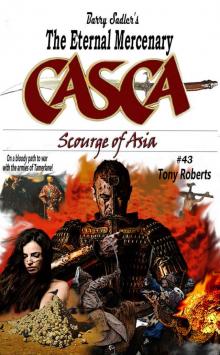 Casca 43: Scourge of Asia
Casca 43: Scourge of Asia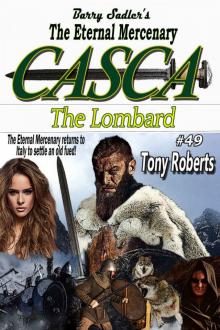 The Lombard
The Lombard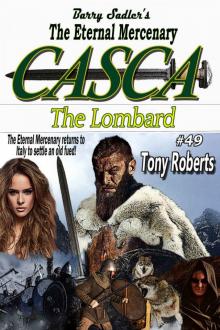 Casca 49: The Lombard
Casca 49: The Lombard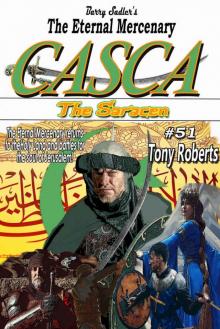 The Saracen
The Saracen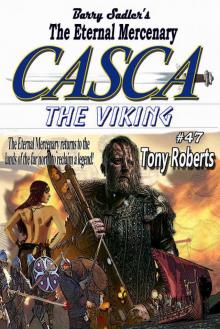 Casca 47: The Viking
Casca 47: The Viking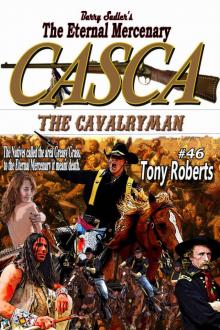 Casca 46: The Cavalryman
Casca 46: The Cavalryman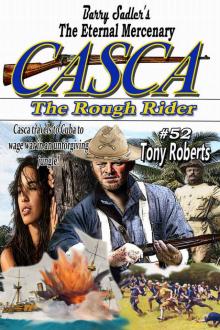 Casca 52- the Rough Rider
Casca 52- the Rough Rider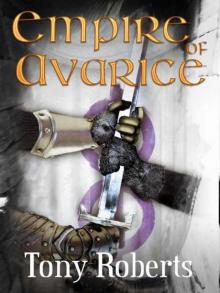 Empire of Avarice
Empire of Avarice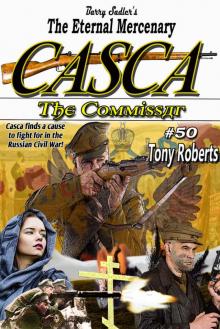 The Commissar
The Commissar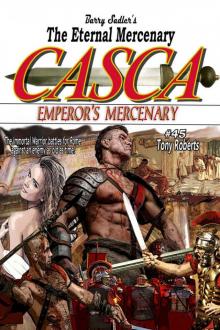 Casca 45: Emperor's Mercenary
Casca 45: Emperor's Mercenary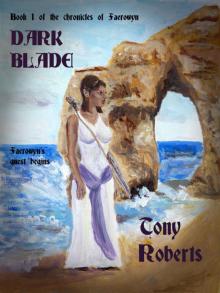 Dark Blade
Dark Blade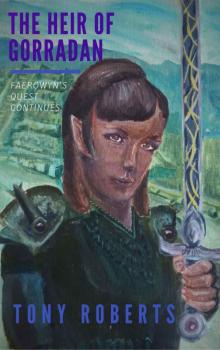 The Heir of Gorradan (Chronicles of Faerowyn Book 2)
The Heir of Gorradan (Chronicles of Faerowyn Book 2)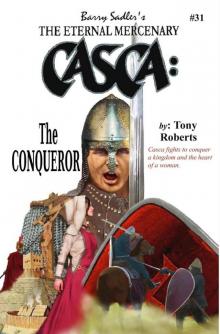 Casca 31: The Conqueror
Casca 31: The Conqueror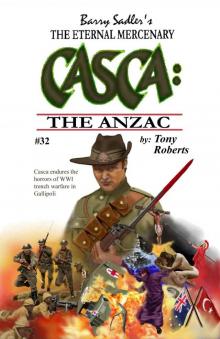 Casca 32: The Anzac
Casca 32: The Anzac The Anzac
The Anzac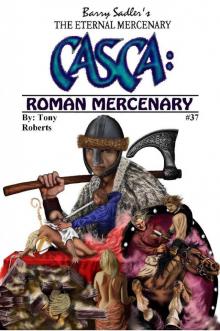 Casca 37: Roman Mercenary
Casca 37: Roman Mercenary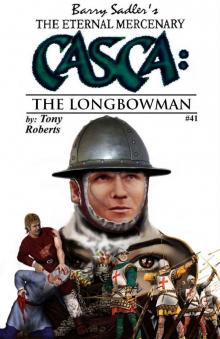 Casca 41: The Longbowman
Casca 41: The Longbowman The Longbowman
The Longbowman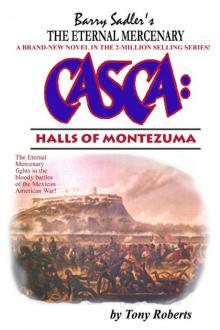 Casca 25: Halls of Montezuma
Casca 25: Halls of Montezuma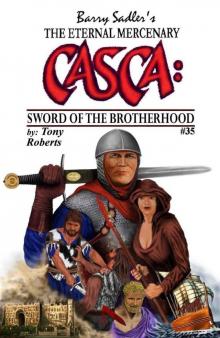 Sword of the Brotherhood
Sword of the Brotherhood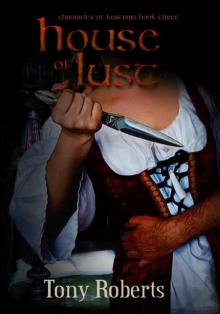 House of Lust
House of Lust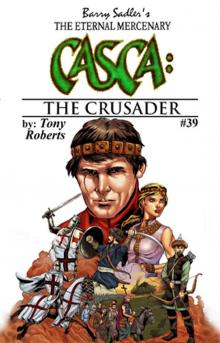 Casca 39 The Crusader
Casca 39 The Crusader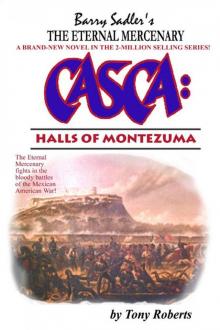 Halls of Montezuma
Halls of Montezuma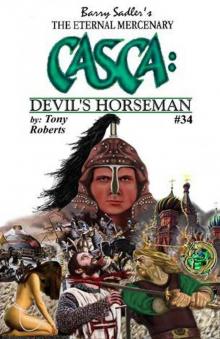 Devil's Horseman
Devil's Horseman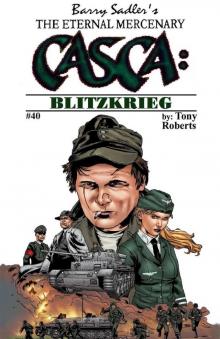 Casca 40: Blitzkrieg
Casca 40: Blitzkrieg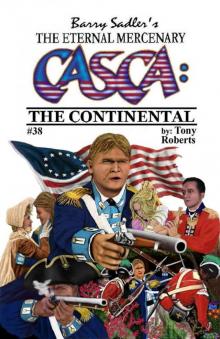 Casca 38: The Continental
Casca 38: The Continental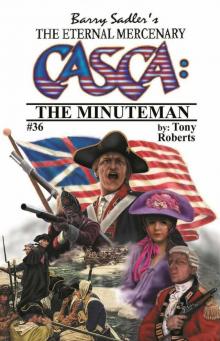 The Minuteman
The Minuteman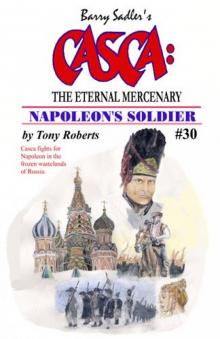 Napoleon's Soldier
Napoleon's Soldier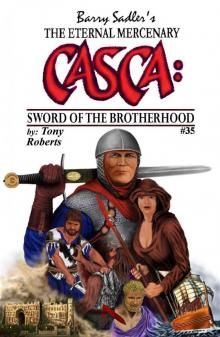 Casca 35: Sword of the Brotherhood
Casca 35: Sword of the Brotherhood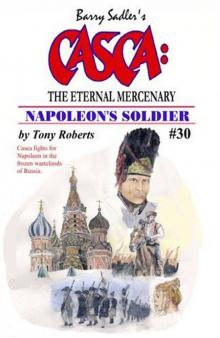 Casca 30: Napoleon's Soldier
Casca 30: Napoleon's Soldier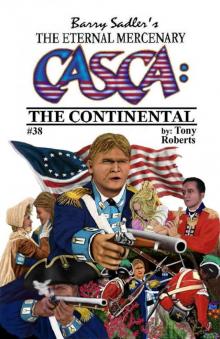 The Continental
The Continental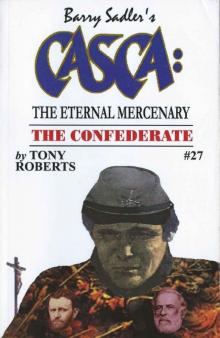 The Confederate
The Confederate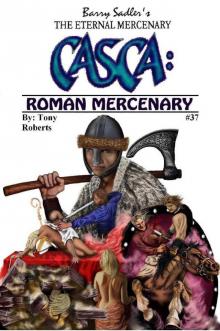 Roman Mercenary
Roman Mercenary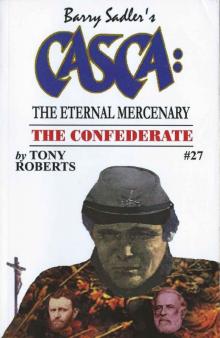 Casca 27: The Confederate
Casca 27: The Confederate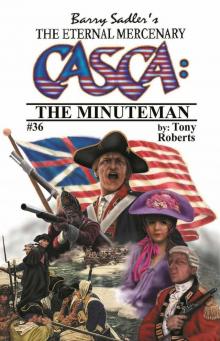 Casca 36: The Minuteman
Casca 36: The Minuteman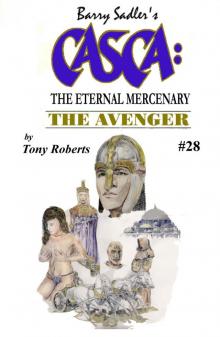 Casca 28: The Avenger
Casca 28: The Avenger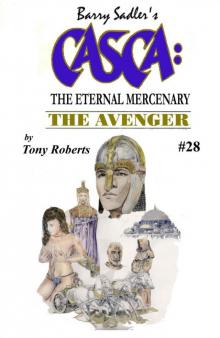 The Avenger
The Avenger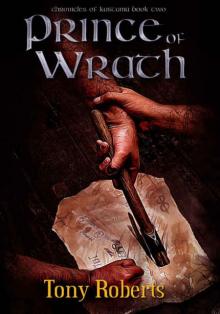 Prince of Wrath
Prince of Wrath